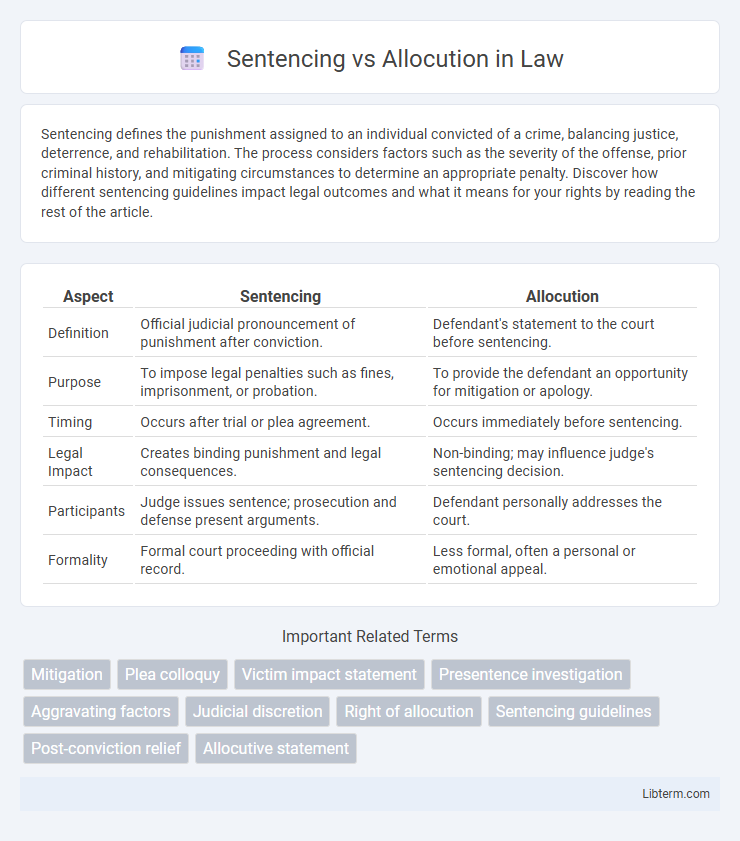Sentencing defines the punishment assigned to an individual convicted of a crime, balancing justice, deterrence, and rehabilitation. The process considers factors such as the severity of the offense, prior criminal history, and mitigating circumstances to determine an appropriate penalty. Discover how different sentencing guidelines impact legal outcomes and what it means for your rights by reading the rest of the article.
Table of Comparison
| Aspect | Sentencing | Allocution |
|---|---|---|
| Definition | Official judicial pronouncement of punishment after conviction. | Defendant's statement to the court before sentencing. |
| Purpose | To impose legal penalties such as fines, imprisonment, or probation. | To provide the defendant an opportunity for mitigation or apology. |
| Timing | Occurs after trial or plea agreement. | Occurs immediately before sentencing. |
| Legal Impact | Creates binding punishment and legal consequences. | Non-binding; may influence judge's sentencing decision. |
| Participants | Judge issues sentence; prosecution and defense present arguments. | Defendant personally addresses the court. |
| Formality | Formal court proceeding with official record. | Less formal, often a personal or emotional appeal. |
Understanding Sentencing in Criminal Proceedings
Sentencing in criminal proceedings determines the legal consequences and penalties imposed on a convicted individual based on the severity of the offense and statutory guidelines. It involves various factors such as prior criminal history, victim impact statements, and sentencing guidelines to ensure a fair and proportionate punishment. Allocution allows the defendant to personally address the court before sentencing, providing an opportunity to express remorse or mitigating circumstances.
Defining Allocution: The Defendant’s Right to Speak
Allocution is a legal right allowing defendants to personally address the court before sentencing, expressing remorse, presenting mitigating factors, or providing their version of events. This opportunity ensures the defendant's voice is heard, potentially influencing the judge's sentencing decision by humanizing the case beyond written evidence. Recognized in many jurisdictions, allocution serves as a critical element of fair sentencing hearings, emphasizing the defendant's active participation in the judicial process.
Historical Origins of Sentencing and Allocution
Sentencing practices trace back to ancient legal codes, such as the Code of Hammurabi, which established fixed punishments for specific crimes, laying the foundation for modern judicial sentencing. Allocution, originating from Roman law, allowed defendants to personally address the court before sentencing, ensuring a voice in their fate within the judicial process. Both concepts evolved over centuries, shaping contemporary criminal justice systems by balancing judicial authority with defendant participation during sentencing.
Key Differences Between Sentencing and Allocution
Sentencing is the formal judicial determination of a criminal defendant's punishment, including imprisonment, fines, or probation, following a conviction. Allocution refers to the defendant's opportunity to personally address the court before sentencing, allowing expression of remorse, apology, or explanation. The key difference lies in sentencing as a legal decision imposing penalties, while allocution is a procedural right enabling defendant participation in the process.
The Purpose and Impact of Allocution Statements
Allocution statements serve as a vital opportunity for defendants to address the court directly, expressing remorse or providing context before sentencing, which can influence the judge's decision. These statements humanize the defendant, potentially mitigating punishment by highlighting factors like personal circumstances or rehabilitation efforts. The impact of allocution lies in its ability to shape the sentencing outcome by fostering empathy and offering a narrative beyond the facts of the case.
How Judges Use Allocution During Sentencing
Judges use allocution during sentencing to hear directly from defendants, allowing them to express remorse, explain circumstances, or present mitigating factors that might influence the severity of the sentence. This process humanizes sentencing by providing a personalized narrative that goes beyond the facts of the case, enabling judges to tailor penalties more fairly. Allocution helps integrate defendant perspectives into the judicial decision-making process, impacting sentencing outcomes in criminal court proceedings.
Legal Standards and Procedures for Allocution
Allocution is a critical phase in criminal sentencing where the defendant addresses the court directly, expressing remorse, providing explanations, or presenting mitigating factors before the final judgment. Legal standards require that allocution be conducted orally, allowing the defendant to speak personally or through counsel, and the judge must consider these statements as part of the sentencing process. Procedurally, courts must inform defendants of their right to allocution, ensuring the opportunity aligns with due process and influences the judicial determination of an appropriate sentence.
The Role of Victims and Prosecutors at Sentencing
Victims and prosecutors play crucial roles at sentencing by presenting victim impact statements and advocating for appropriate penalties based on evidence and legal standards. Victim statements provide the court with personal insights into the harm caused, influencing the judge's decisions on sentencing severity. Prosecutors argue for sentences that reflect the crime's seriousness and public safety, ensuring accountability within the justice system.
Common Challenges in Allocution and Sentencing
Common challenges in allocution and sentencing include managing emotional expression while maintaining clarity and relevance, as defendants often struggle to articulate remorse or provide mitigating information effectively. Judges must balance subjective factors such as sincerity and the defendant's narrative against objective criteria like legal guidelines and precedent to ensure fair sentencing. The complexity of integrating personal statements with legal standards often leads to inconsistent outcomes and challenges in achieving rehabilitation-focused sentences.
Recent Developments and Reforms in Sentencing and Allocution
Recent developments in sentencing emphasize restorative justice and individualized assessments, integrating data-driven risk evaluation tools to tailor sentences more effectively. Reforms in allocution practices enhance defendant participation by allowing more structured and meaningful expressions of remorse or explanation, supporting rehabilitative goals. Legislative changes increasingly mandate transparency in sentencing decisions while expanding opportunities for allocution to promote fairness and emotional closure within the judicial process.
Sentencing Infographic

 libterm.com
libterm.com